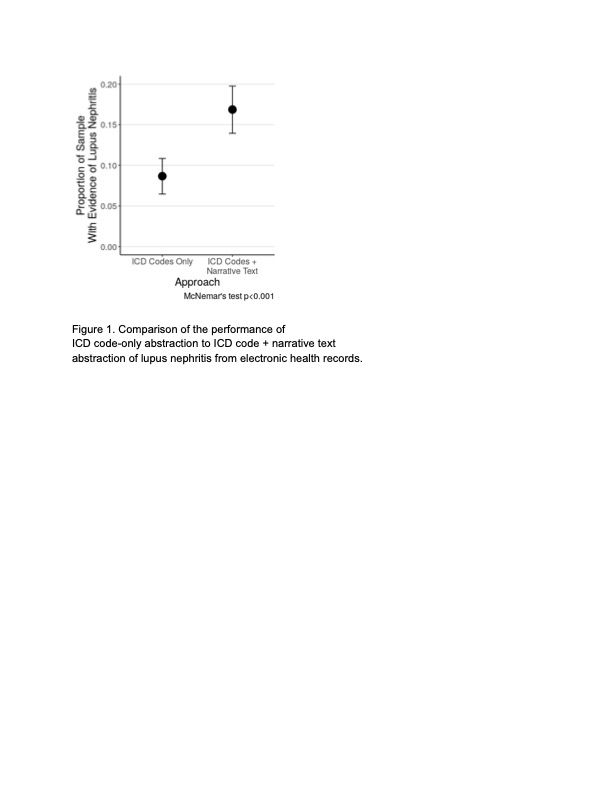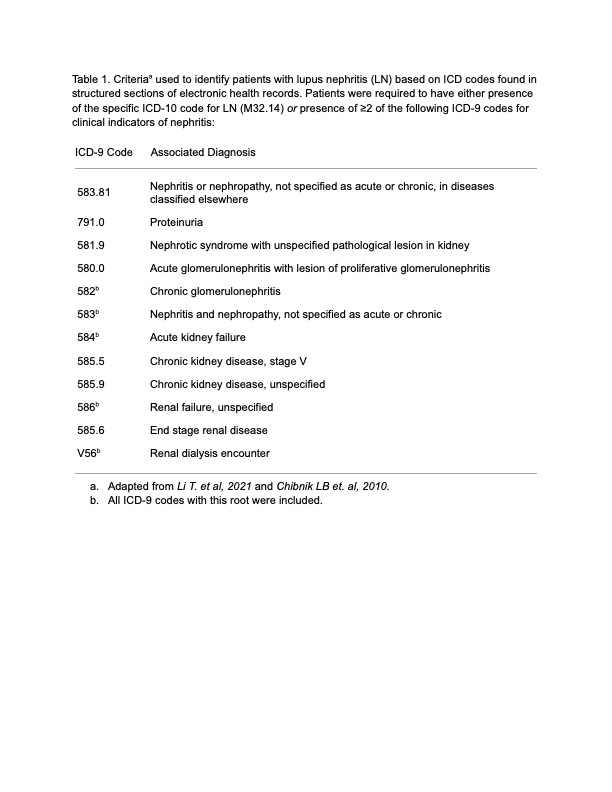Session Information
Date: Saturday, November 6, 2021
Title: SLE – Diagnosis, Manifestations, & Outcomes Poster I: Diagnosis (0323–0356)
Session Type: Poster Session A
Session Time: 8:30AM-10:30AM
Background/Purpose: Lupus nephritis (LN) is often underrecognized and difficult to identify retrospectively, presenting challenges for clinicians and researchers hoping to explore this condition using real-world data (RWD). Common abstraction techniques use ICD codes to pull diagnoses from electronic health records (EHR). However, documentation of LN as a specific diagnosis is an inconsistent practice across providers, leading to underrepresented LN prevalence. Adding abstraction of unstructured narrative text may improve RWD for LN research.
Methods: We retrieved medical records for patients with lupus across the U.S. To be included in the study, patients were required to have a lupus diagnosis documented in their medical record. Natural language processing and human-reviewed machine learning were used to abstract and structure the data. We compared 2 approaches to identifying LN in EHR: 1) Query structured sections of the EHR using an ICD-based case definition* (ICD-only); 2) Employ the first approach but also query all unstructured narrative text for LN-related terms (ICD + narrative text). All terms identified using either approach were manually reviewed for validity. For each approach, we calculated the proportion of the sample with evidence of LN (percent, 95% CI) and compared performance using McNemar’s test.
Results: Our sample of 635 patients with a diagnosis of lupus in their medical record was 95% female, had a median age of 47 years (IQR=39-56), and resided in 46 U.S. states and Washington D.C. Records spanned a median of 5.4 years (IQR=2.4-10.2), including a median of 6 (IQR=3-13) providers and 3 (IQR=1-5) care sites. The ICD-only approach identified evidence of LN in 55 (8.7%, 95%CI = 6.5-10.8%) patients and the ICD + narrative text approach identified 107 (16.9%, 13.9-19.8%) patients (p < 0.001, Figure 1). Leveraging unstructured narrative text identified 95% more patients with LN than only using ICD codes in structured sections of the EHR.
Conclusion: Narrative text abstraction significantly increased capture of LN in this sample of patients with lupus, demonstrating that use of ICD codes alone is not sufficient. An ICD + narrative text has the potential to improve the quality of RWD and better facilitate the generation of RWD for lupus research. Future research should investigate the remaining gap between the rates of LN identified in this manner and the prevalence expected from clinical practice.
*Adapted from Li T. et al, 2021 and Chibnik LB et. al, 2010 (Table 1).
References:
1. Li T, Lee, I Jayakumar D, et al. Development and validation of lupus nephritis case definitions using United States veterans affairs electronic health records. Lupus 2021; 30: 518-526.
2. Chibnik LB, Massarotti EM, Costenbader KH. Identification and validation of lupus nephritis cases using administrative data. Lupus 2010; 19:741-743
To cite this abstract in AMA style:
Tierney M, Rowe C. Addition of Narrative Text Abstraction to ICD-Based Abstraction Significantly Improves Identification of Lupus Nephritis in Real-World Data [abstract]. Arthritis Rheumatol. 2021; 73 (suppl 9). https://acrabstracts.org/abstract/addition-of-narrative-text-abstraction-to-icd-based-abstraction-significantly-improves-identification-of-lupus-nephritis-in-real-world-data/. Accessed .« Back to ACR Convergence 2021
ACR Meeting Abstracts - https://acrabstracts.org/abstract/addition-of-narrative-text-abstraction-to-icd-based-abstraction-significantly-improves-identification-of-lupus-nephritis-in-real-world-data/


